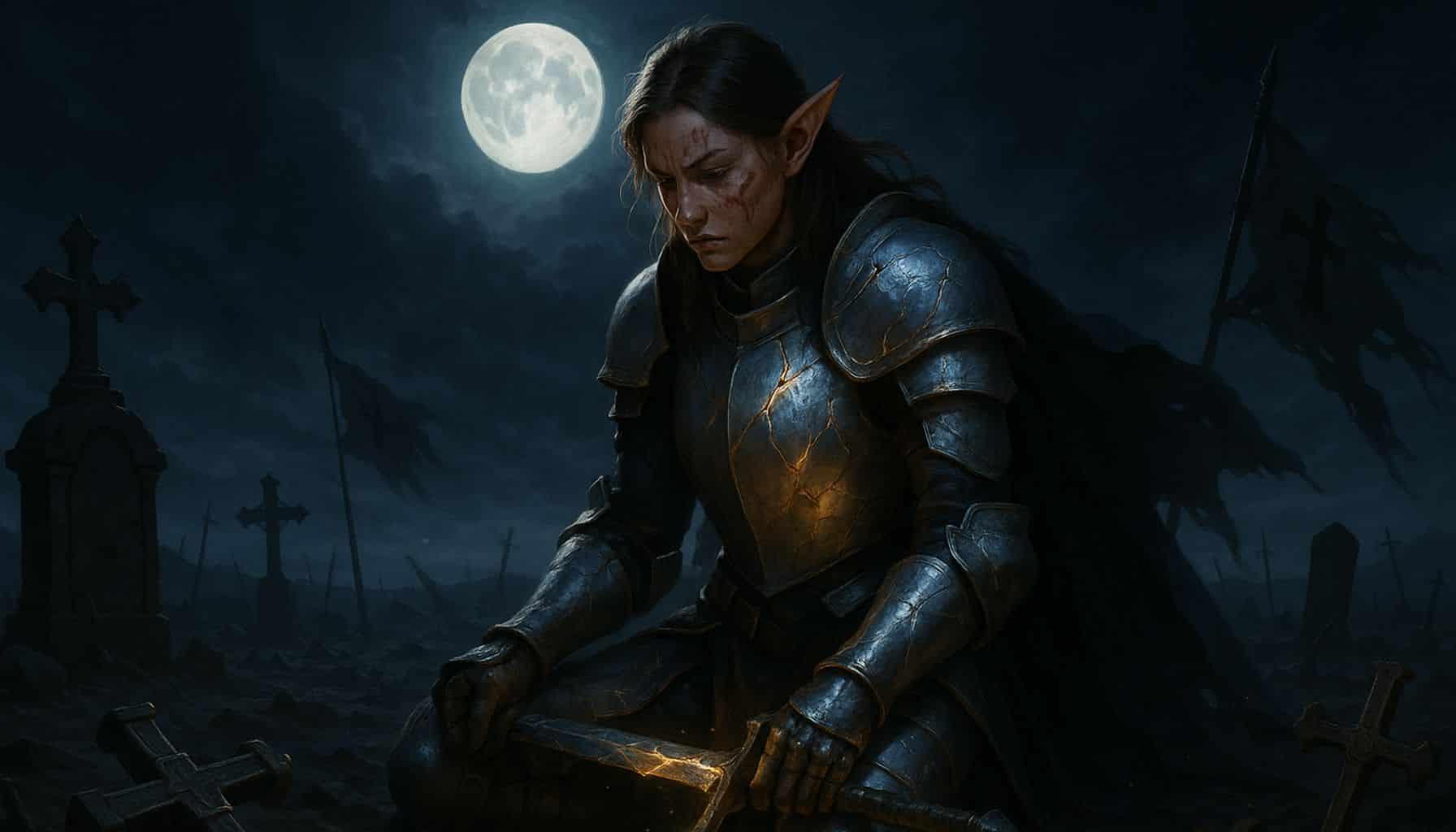The “lawful stupid” paladin has haunted Dungeons & Dragons tables for generations. You know the type: a character with the moral subtlety of a brick, whose devotion to rules supersedes empathy and context. They march into every situation with righteous certainty, ready to smite whoever deviates a hair’s breadth from their code, no matter how irrelevant or destructive the outcome. While this stereotype can earn a fleeting chuckle or a groan, it flattens the roleplaying experience and often derails party cohesion. Adventuring groups quickly grow irritated when every moral dilemma gets resolved by the same shovel-to-the-face brand of justice, killing narrative depth and compelling teamwork.
This one-dimensional approach not only saps the fun out of teamwork but also does an injustice to what paladins are truly capable of representing. Yes, paladins are champions of causes and upholders of oaths, but their inner worlds can be colorfully complex. The best paladins wrangle with the difference between justice and vengeance; they know that real virtue often demands both conviction and compassion. In D&D’s vibrant universe, a paladin’s faith, flaws, doubts, and background can shine just as brightly as their holy sword.
With imagination and a little bravery, paladins can move far beyond mere walking rulebooks. They can become torn redeemers, clever agents, humble community leaders, philosophical doubters, or reformed rebels. Freed from the shackles of black-and-white thinking, the paladin opens up to drama, redemption, heartbreak, and triumph. The character becomes as unpredictable and alive as any wizard, rogue, or bard at the table.
The goal of this article is simple: to shatter the tired mold of “lawful stupid” paladins and offer five fresh, deeply human concepts to inspire your next D&D hero. Each archetype below invites you to probe deeper, connecting your paladin’s story to themes of faith, identity, and personal evolution. It’s time to wield not just the sword, but the power of compelling storytelling. Our paladin backstory generator can help!
- DND Paladin Concept 1: The Redeemer in Recovery
- DND Paladin Concept 2: The Divine Agent on a Mission
- DND Paladin Concept 3: The Local Hero and Moral Compass
- DND Paladin Concept 4: The Zealot with Doubts
- DND Paladin Concept 5: The Oathbreaker Who Still Believes
- Bonus Paladin Background: The Scholar of Sacred Truths
- Final Thoughts on Playing Paladins with Depth
DND Paladin Concept 1: The Redeemer in Recovery
Imagine a paladin whose once-bright armor is tarnished, who bears the weight of a vow broken or an innocent harmed. This Redeemer in Recovery is not rigid or sanctimonious; instead, every action is infused with longing for forgiveness and an urgent need to set things right. Their alignment isn’t held together by stubborn dogma, but by the raw, aching process of reconstruction—a journey from disgrace to dignity, paved with humility and small acts of healing. When other paladins might draw boundaries in black and white, this character sees the grays, striving to embody their ideals through service rather than hollow proclamations.
This paladin’s internal conflict is a rich playground for roleplay. At times, guilt may gnaw at their resolve, making their faith flicker, yet never fully extinguish. They are haunted not by fear of divine retribution, but by disappointment in themselves and the desire to do right by those they failed. Interactions with others are laced with layers—an apology offered to a stranger, a kindness performed with trembling hands, or a moment of doubt before drawing their weapon. Every decision is colored by the tension between past mistakes and the hope for redemption.
Try my AI Tabletop RPG generators...and an extensive library of content!
What makes this paladin truly compelling is their approach to their code. Instead of reciting tenets or acting with bluff certainty, they question, reflect, and adapt. Their ideals are not set in stone, but lived through action—comforting a grieving parent, feeding the hungry, protecting the vulnerable, and finding mercy where vengeance once reigned. All these moments push the character far beyond the stereotype, giving every interaction the pulse of genuine, personal stakes.
For players who crave stories of atonement and moral nuance, the Redeemer in Recovery is a gift. They offer rich opportunities for internal struggle, empathy-building, and the kind of quiet heroism that can shift the course of a campaign. You don’t have to leave your paladin’s values behind—but by weaving them through the tapestry of weakness and hope, you create a character that feels heartbreakingly real.
Roleplay Hooks for a Redemptive Paladin:
- Carrying a token or relic from a failed mission or broken vow
- Refusing to use lethal force unless absolutely necessary
- Forming bonds with former enemies in hopes of mutual healing
- Preaching forgiveness and mercy, even when ignored or mocked
- Seeking out those harmed by their past mistakes to make amends
- Taking on dangerous quests as penance, not for glory
- Protecting outcasts or undesirables the rest of the faith has shunned
- Donating all rewards or spoils to the needy
- Quietly praying for those they’ve hurt—friends and foes alike
- Avoiding positions of command until trust is re-earned
- Being visibly shaken by reminders of their past failures
- Choosing to spare or heal a villain rather than strike them down
- Offering their own punishment or service in exchange for their actions
By playing a Redeemer in Recovery, paladinhood becomes a quest for personal growth rather than rigid authority. Every victory feels earned, every failure a new crucible to face. The stakes are no longer abstract—your character’s very soul is on the line, measured not by adherence to the letter, but by a living commitment to compassion.
This approach welcomes players into the messy heart of virtue, where atonement is not just possible but dramatic. Their journey resonates with anyone who has stumbled, doubted, yet kept fighting for something better. The paladin’s legacy becomes not a statue of stone, but a work ever in progress.
⚔️ Fantasy RPG Random Tables Books
Make life as a Gamemaster easier…
If you play Dungeons & Dragons, Pathfinder, or other fantasy RPGs, this
RPG random tables series
is packed with encounters, NPCs, treasure, and more. Available in eBook or print—either way, you’ll have a wealth of adventure ideas at your fingertips.
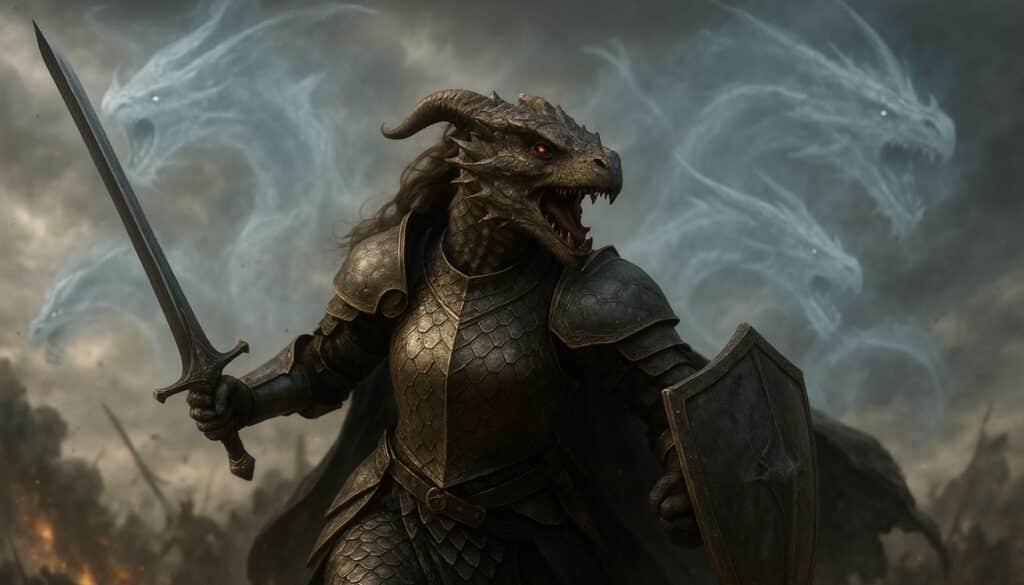
DND Paladin Concept 2: The Divine Agent on a Mission
Picture a paladin whose holy commitment is laced with the calculated precision of a secret agent, not a courtroom judge. The Divine Agent is less about reciting creeds and more about interpreting cryptic visions, carrying out clandestine tasks, and sometimes wading into shades of moral grey for the greater good. Instead of always acting in the open, they might operate with stealth, subtlety—and sometimes, deception. Their piety is real, but so is their willingness to interpret the deity’s will through the lens of present necessity and pragmatic problem-solving.
This model taps into a thrilling narrative tension: ends versus means. The Divine Agent asks uncomfortable questions—what if lying, spying, or even breaking the law is necessary to achieve a holy objective? What if clean hands cannot always get the job done? Instead of shyly turning away from these dilemmas, this paladin owns them, wrestling with how best to serve a cause that transcends mortal laws and customs. Divine instructions come not just as thunderous decrees, but as veiled riddles, dreams, or the faintest of whispers, leaving plenty of space for interpretation—and debate.
Far from being heartless or detached, the Divine Agent is deeply invested in the fate of their mission. They are the kind of paladin who pulls strings behind the scenes, negotiates with unsavory characters, and sometimes plays a long game with cosmic stakes. While their allies might question their choices, the Divine Agent’s loyalty is always to the mission first, which can spark dramatic, trust-testing moments within the party.
This archetype grants players the freedom to explore forms of moral ambiguity rarely available to classic paladins. Conspiracies, coded messages, undercover work, and double-agent dilemmas become part of daily adventuring, transforming the paladin from walking symbol of rigidity into a charismatic, multi-layered operator. The presence of an unflinching, yet flexible, holy purpose infuses every encounter with tension and color.
Traits and Behaviors for a Divine Agent Paladin:
- Following cryptic prophecies or dreams as operational briefings
- Using charm, wit, or deception instead of force
- Rationalizing difficult choices for the greater good
- Debating the meaning of divine will through ritual or meditation
- Forming secret alliances beyond the party’s knowledge
- Delivering clandestine warnings or coded messages
- Using disguises or false identities in pursuit of holy tasks
- Tracking multiple objectives, with priorities shifting as visions change
- Exercising patience and restraint where hotheaded action fails
- Carrying tokens or relics as proof of divine orders
- Willingly sacrificing reputation for a higher cause
- Conferring with their deity through sacred omens in times of doubt
- Facing internal crises if a mission’s morality comes into question
For players who hunger for espionage, intrigue, and moral complexity, the Divine Agent is a perfect fit. Campaigns come alive with secret objectives, shifting allegiances, and daring acts that test not just strength, but subtlety. The lines between obedience and initiative blur, leaving space for improvisation and roleplay.
Playing this paladin archetype allows the table to plunge into the world of cosmic politics, spycraft, and religious ambiguity. Every session becomes a puzzle as the character weighs loyalty to mission against conscience, transforming paladinhood into a thrilling test of faith under fire.
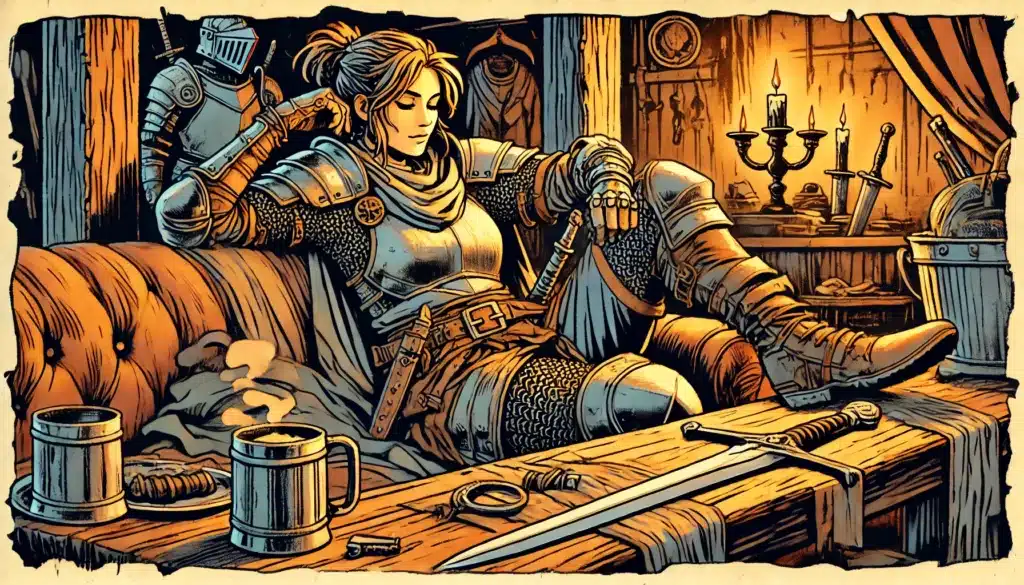
DND Paladin Concept 3: The Local Hero and Moral Compass
Imagine a paladin who isn’t storming castle gates or smiting dragons for distant gods, but tending the crops beside a neighbor or resolving a farmer’s dispute in the village square. This Local Hero sees their sacred calling not as a license for grandstanding, but as a duty to the people around them. Their faith is lived in muddy boots, not marble cathedrals. To them, “goodness” means listening, mediating, and quietly lifting spirits—being a hand at a festival, a shield at the tavern door, a familiar face people trust.
Their power doesn’t come from supernatural charisma or divine spectacle, but from the deep bonds they form with their community. The Local Hero is the person who teaches a scared child how to fish, stands up to petty landlords, and brings wisdom to family quarrels. Forget fiery sermons; this paladin’s ethics are practical, often bending church law to suit the realities of everyday life. They may even disagree with distant clergy or high-minded knights who impose rules without understanding local needs.
Underneath their approachable demeanor lies a core of quiet strength. The Local Hero knows that justice, like bread, starts close to home. They’re unafraid to challenge nobles or corrupt officials if it means protecting their neighbors, and may sometimes stretch or reinterpret holy texts to fit real circumstances. When trouble strikes, they inspire with their actions as often as their words, drawing on folk wisdom and down-to-earth kindness.
Roleplaying this paladin archetype leads to unforgettable moments: improvising solutions for a drought-stricken village, rallying townsfolk to defend their land, or hosting feasts on holy days to nurture togetherness. Every interaction forges storylines rich in loyalty, mentorship, and everyday heroism. The Local Hero is proof paladins need not be distant icons—they can be the living heart of a campaign’s social fabric.
Character Traits and Habits of a Local Hero Paladin:
- Settling tavern brawls with a mixture of patience and empathy
- Hosting or participating in festivals and seasonal rites
- Giving sermons full of practical wisdom, not pomp or mysticism
- Siding with peasants or commoners over aristocrats when justice requires
- Remembering everyone’s name and family history
- Donating time and resources to rebuild after disasters
- Teaching children lessons about courage, kindness, and fairness
- Mediating land or inheritance disputes without resorting to violence
- Encouraging celebrations of small victories
- Protecting the weak from bullies or gossipers
- Valuing folk remedies and old superstitions as much as official doctrine
- Crafting solutions that prioritize peace over punishment
Embracing the Local Hero model invites a campaign to explore relationships, community-building, and what it truly means to embody virtue. Stakes become personal, and every quest resonates beyond personal glory to encompass the well-being of real, relatable people.
⚔️ Fantasy RPG Random Tables Books
Make life as a Gamemaster easier…
If you play Dungeons & Dragons, Pathfinder, or other fantasy RPGs, this
RPG random tables series
is packed with encounters, NPCs, treasure, and more. Available in eBook or print—either way, you’ll have a wealth of adventure ideas at your fingertips.
Through this concept, the paladin’s journey becomes a tapestry of remembered faces, shared traditions, and moral decisions grounded in everyday life. Loyalty, love, and local disputes become the battlegrounds on which true heroism is tested, yielding stories as heartwarming as they are epic.
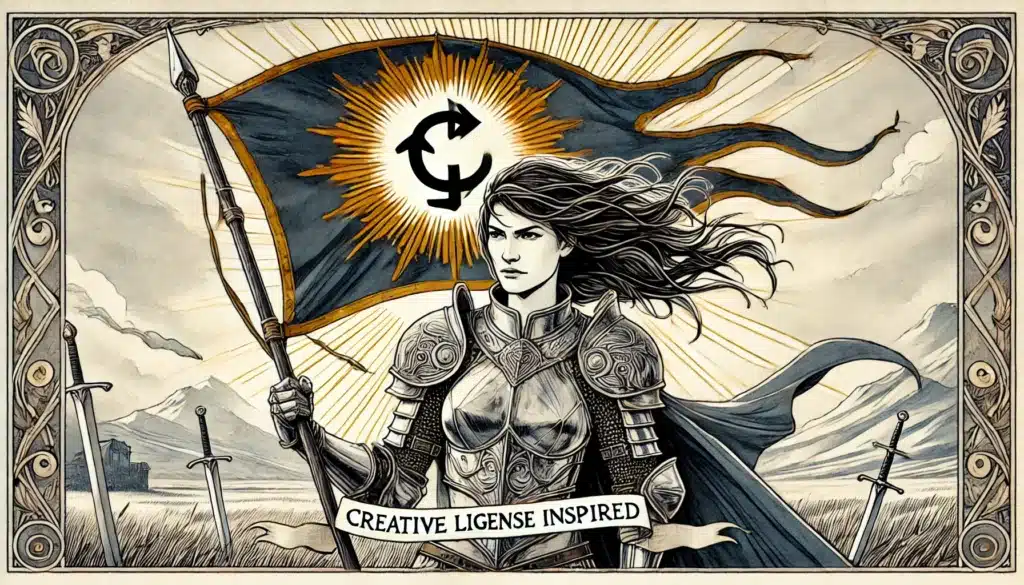
DND Paladin Concept 4: The Zealot with Doubts
Picture a paladin whose belief burns bright but is often buffeted by storms of uncertainty. The Zealot with Doubts is not an icon of blind faith, but a seeker—a holy warrior who listens carefully for guidance and isn’t afraid to confront uncomfortable questions. Their certainty is forged through struggle, not inherited; spiritual progress comes as a series of reckonings with their own limitations. Rather than cracking down on “heretics” or reveling in self-righteousness, this paladin looks inward, measuring their faith against the complexity of the world.
This archetype transforms divine visions, signs, and omens into sources of both inspiration and anxiety. What does a cryptic dream mean? Did that battle end in the way the gods intended? The Zealot with Doubts is always interpreting, always reaching for deeper understanding, sometimes doubting whether their path is righteous at all. These moments catalyze raw, philosophical dialogue within the party and offer a foil for dogmatic NPCs who never question their own certainty.
Roleplaying this paladin means embracing contradiction. Sometimes, circumstances force them to question the tenets of their order—the reality of suffering, or the innocence of a supposed villain. Other times, the paladin resists easy answers, insisting on meditation, prayer, or dialogue in moments when action is expected. These episodes make space for moments of revelation, humility, or even crisis; it’s a journey that humanizes the holy.
The Zealot with Doubts is perfect for players who savor introspective drama. This character can debate theology at the campfire, wrestle with their peers’ worldviews, or face moral choices with true hesitation. When this paladin acts, it’s because they have examined every doubt, every fear, and still found the courage to move forward. Their courage has been tested and seasoned, not granted.
Roleplay Dilemmas for a Questioning Paladin:
- Interpreting divine silence after a desperate prayer
- Debating oaths and beliefs with other paladins or clerics
- Choosing mercy over vengeance in ambiguous situations
- Making peace with an old enemy for the greater good
- Wrestling with guilt over unavoidable collateral damage
- Navigating moral ambiguity in unfamiliar cultures
- Questioning whether their current order still serves the original sacred mission
- Finding inspiration in the goodness of those outside their faith
- Grappling with conflicting interpretations of holy texts
- Refusing to pass judgment before learning all sides of a story
- Defending nonbelievers or heretics when their rights are threatened
- Discovering beauty and wisdom in imperfection and change
This style of paladin allows you to probe the psychological and spiritual side of faith, offering a campaign arc full of reflection and philosophical growth. Players can explore doubt without losing touch with conviction, giving rise to moments of triumph earned through struggle.
With the Zealot with Doubts, a paladin’s alignment becomes a horizon to chase rather than a cage. The character’s story resonates with anyone who has questioned, stumbled, and come out stronger. Their faith, forged in uncertainty, becomes all the more compelling.
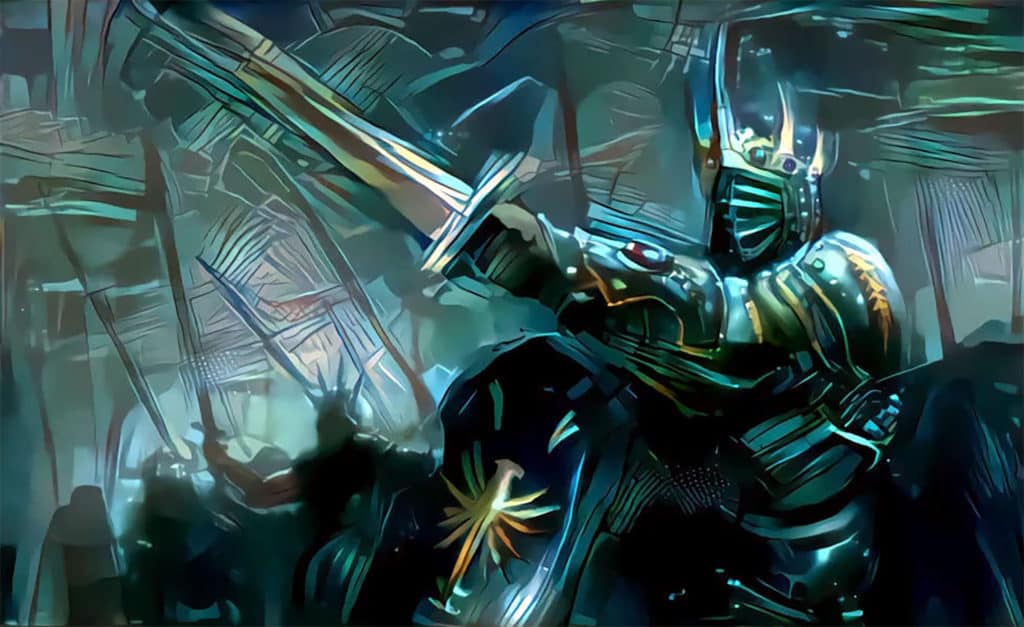
DND Paladin Concept 5: The Oathbreaker Who Still Believes
Not all paladins maintain the approval of their order or their deity—sometimes, a betrayal, failure, or disillusionment severs them from their source of power. Yet the Oathbreaker Who Still Believes isn’t a villain or nihilist. They’re a character who clings stubbornly to goodness, forging a new purpose through willpower and conscience alone. Stripped of official sanction, they must define what “paladin” means in the absence of external validation or the trappings of power.
Try my AI Tabletop RPG generators...and an extensive library of content!
This archetype thrives on the tension between institutional identity and personal conviction. Maybe the order abandoned them, or perhaps the paladin defied commands they believed were unjust. Broken oaths could stem from mercy in defiance of a law, or refusing to uphold flawed doctrine. Now, the Oathbreaker stands alone, tested anew, seeking opportunities to protect the innocent or thwart evil without the blessing—or the burden—of a higher authority.
Without the strictures of church or order, this paladin’s actions are guided by inner compass. They may operate in secret, protecting the weak in anonymity, or confront their former organization as a whistleblower or rebel. The loss of official rank brings both pain and liberation—the ability to choose new ideals, allies, and methods for doing good. Banishment becomes a crucible for self-discovery, not a descent into villainy.
Roleplaying the Oathbreaker Who Still Believes breathes fresh air into the paladin archetype. Their morality becomes deeply personal, their journey laced with regret and hope. Every act of kindness is defiance. Every struggle, a step toward reforging identity on their own terms. They are living proof that virtue can survive outside of institutions and written oaths.
Motivations for an Oathbreaker Paladin Who Still Does Good:
- Secretly protecting a community they can no longer openly serve
- Opposing corrupted former allies or leaders
- Mentoring a young, idealistic paladin to avoid past mistakes
- Rediscovering faith through acts of simple kindness
- Helping the marginalized, especially those maligned by the order
- Gathering evidence against a corrupt church or institution
- Wearing a disguise to continue serving the public while in exile
- Sacrificing personal safety for the sake of penance or closure
- Rebuilding a shattered code of ethics from experience, not dogma
- Seeking forgiveness from loved ones harmed by past zealousness
- Developing new rituals that reflect changed beliefs
- Acting as a voice of reason among outcasts or rebels
Playing this kind of paladin can produce some of the most intense, emotional, and memorable arcs in any campaign. Identity, loyalty, and redemption cut far deeper when you’ve lost it all, yet still stand your ground for what’s right.
With the Oathbreaker Who Still Believes, paladinhood flourishes as a story of agency, resilience, and personal truth. The archetype dares you to ask what you’ll fight for when everything else is stripped away—and invites the rest of the table to ponder the meaning of devotion without dogma.
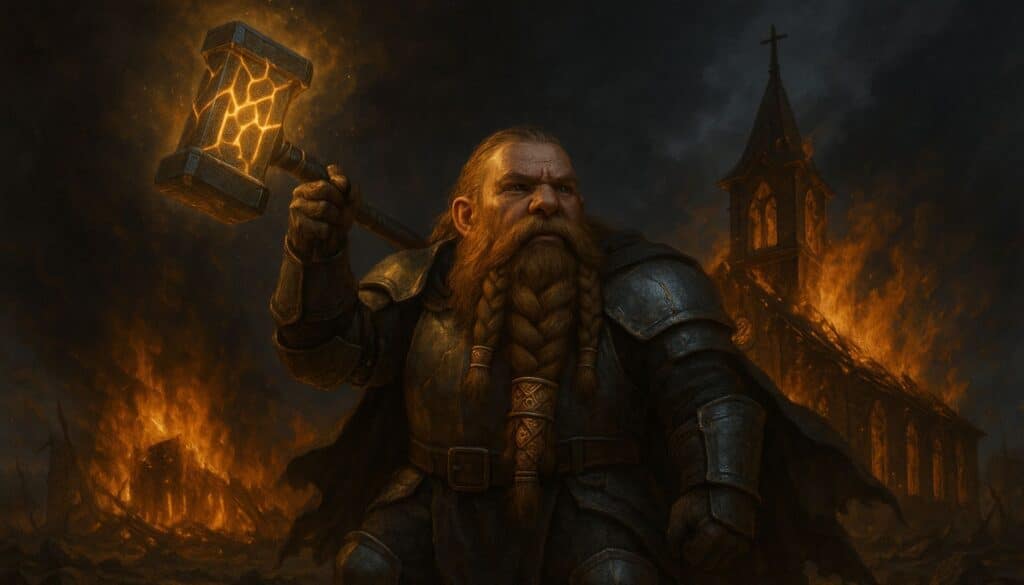
Bonus Paladin Background: The Scholar of Sacred Truths
Not all paladins stride into the world wielding swords and shields—some dedicate their lives to unraveling the mysteries of the divine and the cosmos at large. The Scholar of Sacred Truths is an intellectual paladin, a seeker whose sacred calling demands skepticism, research, debate, and the patient pursuit of knowledge. This character’s faith is tested and refined by study as much as by battle. For the Scholar, service to their deity is an ongoing dialogue, a journey of inquiry that’s just as likely to happen in dusty libraries and theological forums as on the field of valor.
The Scholar’s specialty is using brains as much as brawn. Their sense of justice is rooted in understanding; they approach problems with research and conversations before drawing conclusions or weapons. When they encounter a new cult, heresy, or ancient evil, they begin with investigation—pouring over old scrolls, conducting interviews, and piecing together the lost wisdom of ages. This intellectual curiosity makes them invaluable to parties tackling mysteries, curses, or lore-driven quests. The Scholar’s aura of authority comes not from loud proclamations, but from their unshakable grasp of arcane and sacred truths.
Within the party, the Scholar bridges gaps between faiths, social classes, or even entire cultures. Instead of dismissing heretics or outsiders, they engage with challenging philosophies and try to integrate the best of what they find into their own worldview. This openness can sometimes put them at odds with more traditional clerics or rigid knights, but it also allows them to reconcile factions and discover lost rituals that might otherwise be erased from history. Their “oath” is to understanding itself—the belief that divine wisdom is inexhaustible and that every perspective, even blasphemous ones, can serve as a stepping stone toward deeper knowledge.
For the Scholar of Sacred Truths, roleplay centers around curiosity, humility, and the thrill of discovery. Imagine the paladin who files treatises on justice, debates with other scholars over massive tomes, or negotiates peace between warring sects by showing them their beliefs are two sides of the same holy truth. Imagine the quest for a legendary relic that’s just as much about decoding riddles as it is about glorious battle, or a moment of doubt turned into revelation by a careful reading of a forbidden text. The Scholar is a beacon for parties who love mysteries, history, and philosophical storytelling.
Roleplay Hooks, Goals, and Behaviors for a Scholar of Sacred Truths Paladin
| Trait/Behavior | Description |
|---|---|
| Maintaining meticulous journals | Keeps notes on every adventure, holy site, and philosophical debate |
| Practicing ancient rituals from varied cultures | Performs lost or rare rites respectfully, regardless of origin |
| Debating faith and ethics with party members | Invites open discussion about holy law, even with skeptics or rivals |
| Seeking rare scrolls, relics, or divine artifacts | Pursues legendary knowledge as fervently as magic swords |
| Translating holy texts from dead languages | Unlocks secrets by reconstructing forgotten scripture |
| Questioning the origins of paladin oaths | Investigates how and why each vow came to be, and whether updates are needed |
| Pursuing peaceful dialogue with “heretics” | Tolerates, even befriends, those with radically different beliefs |
| Collaborating with wizards and bards | Forms alliances with other loremasters to unravel cosmic mysteries |
| Presenting lectures or sermons on new discoveries | Shares insights through stories, public lessons, or private counsel |
| Correcting misconceptions within the church | Politely challenges authority when tradition clashes with new knowledge |
| Defending libraries, temples, or sages from harm | Treats the preservation of wisdom as a sacred duty |
| Practicing humility in the face of paradox | Admits when a question has no answer, embracing awe instead of dogma |
| Refusing to destroy “evil” artifacts outright | Argues for study and understanding before judgment |
| Seeking wisdom from elders of all faiths | Respects any seeker of truth, not just those of their own tradition |
| Taking time for scholarly debate even in crises | Sometimes pausing in dangerous times to consult texts or debate strategy |
| Mending or copying ancient manuscripts | Values restoration and preservation over destruction |
| Composing their own personal creed | Drafts a living, evolving code based on cumulative experience and revelation |
| Noting the philosophical implications of events | Observes and records lessons in the unfolding stories of the group |
| Counseling others using parables and allegories | Draws upon stories and folklore to teach or comfort party members |
| Cautiously optimistic about divine revelations | Interprets new omens skeptically, balancing faith with reason |
| Developing friendships with “outsider” scholars | Actively seeks out those shunned by mainstream faith for their knowledge or insight |
| Challenging dogma with respectful curiosity | Disagrees without arrogance, fostering growth and dialogue |
| Scribing illuminated manuscripts to inspire others | Turns discoveries into works of art, making faith tangible for all |
| Obsessing over a question left unanswered | Admits when ignorance remains, using it to drive their own personal journey |
| Championing education for the next generation | Sponsors or teaches young students in the ways of faith and inquiry |
The Scholar of Sacred Truths paladin archetype turns every campaign into a possibility for discovery that goes beyond swords and spells. By rooting their arc in the search for meaning—the willingness to question, adapt, and grow—they embody a kind of heroism that is as intellectual as it is heart-driven. They fit beautifully into campaigns where knowledge is power and competing moral systems vie for acceptance.
This style of paladin encourages collaboration, bridges cultural divides, and opens up storylines that draw on the full richness of your campaign’s lore. When the party hits a crossroads, the Scholar doesn’t just quote dogma—they examine, discuss, and help everyone find the most thoughtful way forward.
Incorporating the Scholar of Sacred Truths adds emotional and intellectual depth to party dynamics. It supports DMs who want to weave mysteries, lost knowledge, and diplomatic challenges into their worlds, all while giving paladin players the satisfaction of setting out not just to change the world, but to understand it more deeply. The result is a class that consistently surprises, inspires, and proves—once and for all—that complexity is the soul of meaningful roleplay.
Final Thoughts on Playing Paladins with Depth
The “lawful stupid” paladin stereotype is a storytelling dead end—an easy joke that undercuts the immense narrative potential built into the class. Roleplayed as unyielding, thoughtless enforcers of the law, paladins quickly outstay their welcome and flatten the emotional texture of any campaign. Even the most awe-inspiring powers can’t redeem a character who constantly derails party goals or ignores context in favor of rote, mechanical responses. It’s a disservice to both the lore and the living tradition of tabletop roleplaying.
But when you break free from that tired template, paladins transform. By exploring personal flaws, doubts, complex relationships, and evolving beliefs, you unlock the ability to tell stories that resonate on every level—from epic battlefields to the intimate moments in a village square. These paladins don’t just issue pronouncements or quote doctrine; they wrestle openly with what it means to be good, just, and true in a world built on ambiguity. Faith becomes a journey, not a static badge.
If you choose to experiment with one of the five archetypes above, you’re embracing the full narrative weight and emotional color that the paladin class can offer. You might portray a soul wracked by remorse, a holy agent straddling the shadows, a gentle village hero, a doubter hungry for assurance, or an exile still burning with righteousness. Each approach offers fresh opportunities for roleplaying, teamwork, and dramatic growth.
⚔️ Fantasy RPG Random Tables Books
Make life as a Gamemaster easier…
If you play Dungeons & Dragons, Pathfinder, or other fantasy RPGs, this
RPG random tables series
is packed with encounters, NPCs, treasure, and more. Available in eBook or print—either way, you’ll have a wealth of adventure ideas at your fingertips.
Paladins, when played with depth and vulnerability, are more than icons—they’re mirrors for our own ideals, struggles, and hopes. They can falter, fail, forgive, and be forgiven. They can aspire to impossible heights and still touch the everyday lives of those around them. Your paladin’s story can be one of inspiration, heartbreak, and hard-won triumph—provided you let yourself explore beyond the simple “thou shalt not.”
Finally, Dungeon Masters have a vital role in supporting these nuanced character types. Challenge your paladins with dilemmas that test more than doctrine—bring them moral ambiguity, conflicting duties, or the chance to redeem rather than punish. Build worlds where complexity is rewarded, not penalized, and where faith is an evolving, living force. That’s the key to transforming every session from a checklist of oaths to an epic journey of the soul.

